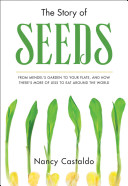2018 School Spending Survey Report
The Story of Seeds: From Mendel's Garden to Your Plate, and How There's More of Less to Eat Around the World
144p. chron. further reading. glossary. index. photos. HMH. 2016. Tr $17.99. ISBN 9780544320239.
COPY ISBN
VERDICT An impassioned call to action, likely to leave readers both scared and inspired.
ALREADY A SUBSCRIBER? LOG IN
We are currently offering this content for free. Sign up now to activate your personal profile, where you can save articles for future viewing





Be the first reader to comment.
Comment Policy:
Comment should not be empty !!!